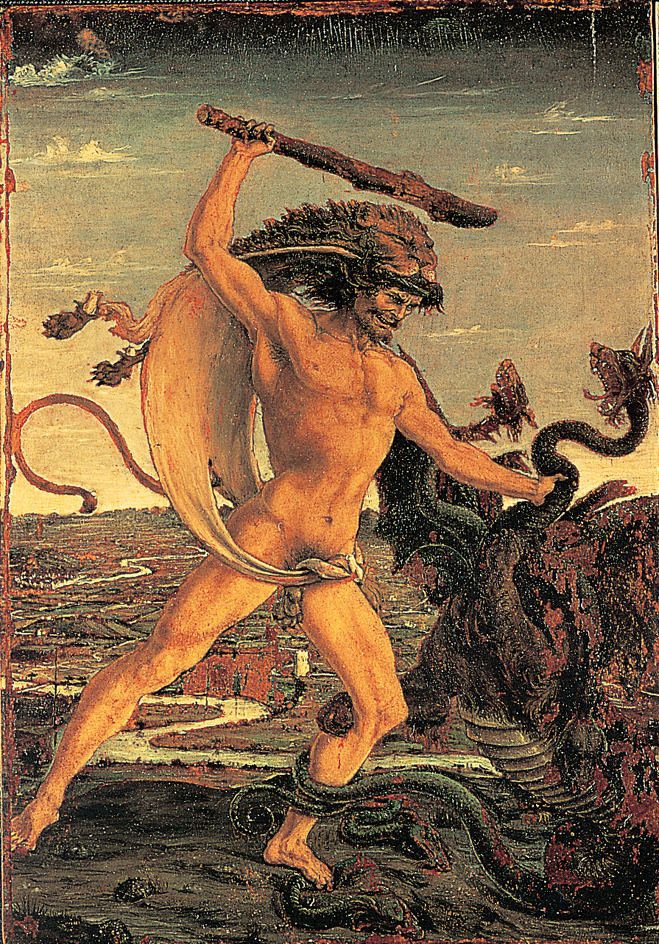Hercules, << HUR kyuh leez, >> was one of the greatest heroes of Greek mythology. The Greeks called him Heracles, but he is usually known as Hercules, the name used by the Romans.
Early life.
Hercules was born in Thebes. He was the son of the princess Alcmene, a mortal, and Zeus, the king of the gods. Hera, the wife of Zeus, was jealous of Alcmene and hated Hercules. She persecuted Hercules throughout his life.
When Hercules was an infant, Hera sent two serpents to kill him. However, Hercules strangled the snakes. As a young man, Hercules had a vision. In it, he was offered a choice of a life of ease, pleasure, and vice, or one of hardship, danger, glory, and virtue. He chose the more difficult—but virtuous—life.
The twelve labors.
Hera caused Hercules to have a fit of madness, during which he killed his wife, Megara, and their children. The oracle at Delphi told Hercules that he had to serve King Eurystheus of Tiryns for 12 years to purify himself of the murders.
Eurystheus commanded Hercules to perform 12 labors, which are described, with many variations, by a number of ancient authors. This section deals with the most generally accepted versions of the labors.
The first six labors
took place near Thebes. First, Hercules killed the fierce lion of Nemea, whose skin he then wore as a trophy. Next, with the help of his nephew Iolaus, Hercules slew the deadly Hydra of Lerna. This serpent had several heads that grew back as soon as they were cut off. Hercules cut off the heads, and Iolaus sealed each neck with fire to prevent them from growing back. The hydra also had one head that was immortal, which Hercules buried under a rock. He then used the hydra’s blood to poison his arrows.

For the third and fourth labors, Hercules captured the huge boar of Erymanthus and the golden-horned Arcadian stag. For his fifth labor, he drove a flock of ferocious birds away from the woods near Lake Stymphalus. These birds had arrowlike feathers that they shot at people. Next, Hercules cleaned the stables of King Augeas by making two rivers flow through them.
The second six labors
took Hercules increasingly farther from his home. For the seventh labor, he traveled to Crete to capture the bull of King Minos. For the eighth, Hercules brought the horses of King Diomedes of Thrace to Eurystheus. These horses ate human beings, but Hercules tamed them by feeding them Diomedes. For the ninth labor, Hercules obtained the girdle (belt) of Hippolyta, the queen of the Amazons, by defeating her in battle (see Amazons).
To perform the 10th and 11th labors, Hercules journeyed to the western edge of the ancient world. First, he captured the cattle of the fearful monster Geryon. Then he stole the Golden Apples of the Hesperides from the Tree of Life (see Hesperides). For his 12th labor, Hercules descended into the world of the dead, captured the three-headed watchdog Cerberus, and brought him back to the upper world (see Cerberus). The last three labors represented the conquest of death, and Hercules achieved immortality by carrying them out.
Other adventures
of Hercules included accompanying the Argonauts on part of their voyage in search of the Golden Fleece. He also restored Alcestis, the wife of King Admetus, to life by outwrestling Death. Hercules released Prometheus from the punishment to which Zeus had condemned him. Also, Hercules overcame the giant Antaeus, whose strength was renewed by contact with his mother, Earth, by holding him off the ground until he weakened. See Argonauts; Prometheus.
The death of Hercules.
Some time after completing the 12 labors, Hercules married the princess Deianira. The centaur Nessus tried to rape Deianira, and Hercules shot him with a poisoned arrow. The dying centaur told Deianira to smear some of his blood on Hercules’ robe if she ever needed to win back his love. After Hercules fell in love with another princess, Iole, Deianira followed Nessus’ advice. But the centaur’s blood had been poisoned by Hercules’ arrow. When Hercules put on the robe, it burned him so terribly he pleaded to be placed on a funeral pyre. His body was consumed by flames, and he was taken to Mount Olympus, home of the gods. There, he became a god.
